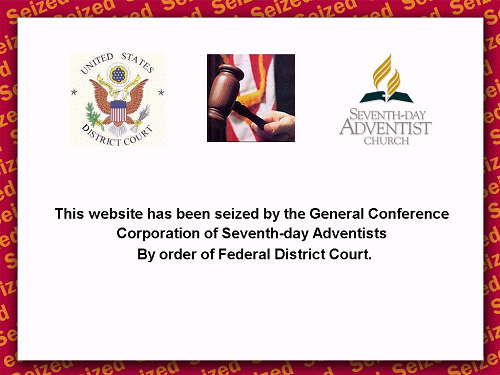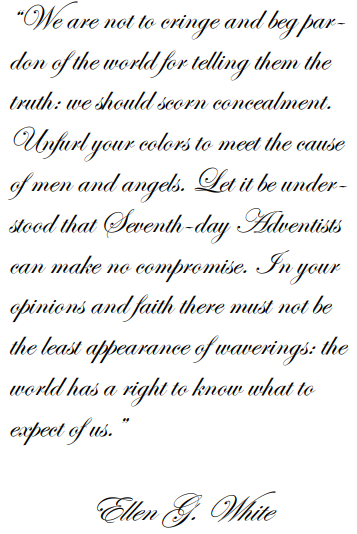Misuse of Prophecy
The Scriptures are filled with prophecies; prophecy is, in fact, one of the strongest evidences for the inspired nature of the Bible. When we view (for example) the predictions made by the prophet Daniel regarding the progression of Empires from Babylon through Rome, there should be little doubt that there was divine foreknowledge involved.
On the other hand, few of the predications made in Scripture contain explicit references to the exact time of their fulfillment. Isaiah spoke of a prophecy being fulfilled before the weaning of a child. (Isa 7:16) Jeremiah spoke of seventy years of Israelite captivity in Babylon. (Jer 25:11) Daniel recorded the exact year of the coming of the Messiah and the final stages of the atonement process. (Dan 8:14, 9:24) Beyond these, however, little is said of the timing of prophetic fulfillment.
The Children of Yahweh are given signs for which to watch, so that we will not be surprised by the events that take place around us. We are told, “Surely Adonai Yahweh will do nothing, but He revealeth His secret unto His servants the prophets.” (Amos 3:7) And again, “Heaven and earth shall pass away: but my words shall not pass away. And take heed to yourselves, lest at any time your hearts be overcharged with surfeiting, and drunkenness, and cares of this life, and so that day [of judgment] come upon you unawares.” (Luke 21:33-35)
It is apparent from the prophecies available to us that the precise date of prophetic fulfillment is far less important than the circumstances surrounding it. Of that most important prediction, the return of the Messiah at the end of the age, we are instructed, “Blessed is that servant, whom his Lord when he cometh shall find so doing [i.e., being faithful]. Of a truth I say unto youthat he will make him ruler over all that he hath. But and if that servant say in his heart, ‘My lord delayeth his coming,’ and shall begin to beat the menservants and maidens, and to eat and drink, and to be drunken, the lord of that servant will come in a day when he looketh not for him, and at an hour when he is not aware, and will cut him in sunder, and will appoint him his portion with the unbelievers.” (Luke 12:43-46)

Due to the conditional nature of practically every Biblical prophecy, a topic covered extensively in our previous publications, the fulfillment of Yahweh’s promises may be delayed, (Jonah 3:4) or the intended recipients may be replaced if the originals prove chronically unworthy. (Mat 21:43) What this means is that, when it comes to interpreting the Bible’s statements about future events, we must learn to read for principle as much as for specifics. If the Scriptures warn about a flood and we, through carelessness and presumption, are careless with matches, can we honestly complain that we were unwarned of disaster if our property is consumed by fire instead of water? Are we any less ruined? The great failure of the Jewish nation was that, upon accepting the promises that Israel would not be rejected, they used that confidence as the very justification for the activities that led to their rejection.
They did not meet the conditions – at times implied and at times openly stated – that would attend their continued spiritual prosperity.
Yahshua said, “Thou shalt not tempt the Lord thy God.” (Matthew 4:7) Humanity is promised salvation through the life, sacrifice and subsequent ministry of the Messiah, yet Seventh-day Adventists do not believe (and rightly so) that all men will be saved; nor do we believe in the once-saved-alwayssaved position of some Evangelical groups. We are told of the saints by Christ in no uncertain terms: “My Father, which gave them me, is greater than all; and no man is able to pluck them out of my Father’s hand.” (John 10:29) This is an absolute truth, yet freedom is not eclipsed by salvation; there may not be a power in Heaven or on earth that can tear us out of the Father’s hand, but what force is there that prevents us from choosing to jump off? Satan’s force is employed to keep us from that hand, not to retain us there; Yahweh will not use force to secure love and loyalty… mankind is always left free to choose. This is the nature of genuine love.
Based on these factors we have been discussing, it may be therefore said that there are two errors into which one may fall when examining Bible prophecies. The first is time-setting, and the second (a related error) is the idea of holding specifics over principles.
1) Time-setting is an obvious danger. Adventists, who have the benefit of Ellen White’s writings, have long been warned of this process. She wrote, “We are not of that class who define the exact period of time that shall elapse before the coming of Jesus the second time with power and great glory. Some have set a time, and when that has passed, their presumptuous spirits have not accepted rebuke, but they have set another and another time. But many successive failures have stamped them as false prophets.” [Last Day Events, page 34] “Again and again have I been warned in regard to time-setting. There will never again be a message for the people of God that will be based on time. We are not to know the definite time either for the outpouring of the Holy Spirit or for the coming of Christ.” [Review and Herald, March 22, 1892, emphasis added]
Additionally, she writes, “The more frequently a definite time is set for the second advent, and the more widely it is taught, the better it suits the purposes of Satan. After the time has passed, he excites ridicule and contempt of its advocates, and thus casts reproach upon the great Advent movement of 1843 and 1844. Those who persist in this error will at last fix upon a date too far in the future for the coming of Christ. Thus they will be led to rest in a false security, and many will not be undeceived until it is too late.” [The Great Controversy (1888), page 456]

These are warnings that have been persistently ignored by certain figures in Adventist circles, particularly in the independent ministries. Some have attempted to set a definite year for the Second Advent based on the feasts, based on the Jubilee year, based on any other number of factors, and they have been consistently proven wrong by the course of history, weakening their own effectiveness and the credibility of the Three Angels’ Message. While it is certainly true that we can know various things about the time of the return of Christ – for example, from the agricultural symbolism involved, and the fact that Christ’s sacrifice took place on a literal Passover, it is reasonable to conclude that His return for the “harvest” of earth will take place at the end of the literal Feast of Tabernacles – we are never instructed regarding the year.

This first error, therefore, harms the cause of the saints in two ways. First, by ignoring inspired cautions and setting repeated predictions too early, the force of the message is largely lost.Second, and far more importantly, by setting the date too far in the future, the urgency of the testimony is destroyed, and men will not be prepared for the events when they do occur, particularly if they take place in an unexpected manner (this is dealt with in more detail below).
Time-setting of the prophecies may be compared to setting one’s alarm clock earlier than one truly wishes to awaken. “I will be roused gradually,” the individual says, “and I can use my snooze button to get a few more minutes of rest each time.” The problem with using a snooze button to get ten minute cycles is that in the case of prophecy we do not know when we are truly to awaken. Yahshua arrives, sooner than the sleeper thinks, and he is unconscious during one of his “ten minute” sessions. Knowing the signs that will arise when the return of Yahshua is near is not an excuse to lapse into Laodicean comfort until those expected signs appear.
2) The second danger is in expecting the prophecies to be fulfilled precisely as they are described, even if the conditions that were to bring them about are not fulfilled. This last phrase, emphasized, is most important. This idea is not at all to suggest that the prophecies of the Bible are anything less than reliable, but to point out that Yahweh is as free as any created being, and can (and has) altered the fulfillments of His promises to reflect the current spiritual state of His people. If any would doubt this, the question may be asked, “What percentage of the prophecies that were both given and fulfilled in the Scriptures were properly anticipated by God’s people?”
Were the Hebrews expecting the Babylonian exile? Were the Pharisees and Sadducees expecting Christ as He then appeared? Will the majority of Christendom be prepared for the Second Advent?
The message of the Bible is indeed simple, but this does not mean it yields its treasures without earnest study and prayer. Paul instructs Timothy, “Study [Gk: spoudazo – make haste, exert yourself, work hard] to shew thyself approved unto God, a workman that needeth not to be ashamed, rightly dividing the word of truth.” (2Tim 2:15) If people rely upon the messages of the past, without an eye to the current signs of the times, then they will be taken unawares. They will say, “We were promised it would take place in this manner,” but they will have just as little excuse as the Jewish Nation. Yes, the prophecies declared that the Messiah would come in kingly glory, but had they been reading for principle rather then letter, they would have seen that “kingly glory” does not stand in opposition to His lowly, servant-like status. The Kingdom of Yahshua is not based upon any force of arms, as the nation had been anticipating, but authority of a different, and infinitely greater, kind.
An example of this with which Creation Seventh Day Adventists are often and intimately acquainted is the offhanded way in which our warnings about church-related lawsuits are dismissed. Warning after warning is given in the Bible, in the writings of Ellen White, in the writings of our Adventist pioneers, and finally by the messengers of this generation.
While so many are expecting (because of the letter of past testimonies) a National Sunday Law to fulfill the union of Church and state that will produce an unjust liberty-restricting law, they fail to see just such a union, and just such a law, before them even now. The time has been set so far in the future that it has indeed come to pass as we were fore-warned; Adventism byand-large has been “led to rest in a false security, and many will not be undeceived until it is too late.”
“The Trademark law cannot be a mark of the beast,” we are told, “because Ellen White never saw any such thing.” This is a false security . The Hebrews had both the regal description of Christ and statements such as “thy King cometh unto thee: He is just, and having salvation; lowly, and riding upon an ass, and upon a colt the foal of an ass.” (Zech 9:9b) Had they taken both these things into account, they would have been better prepared for the day of their visitation. Likewise, Adventists have strong statements regarding a National Sunday Law, but they also have statements such as: “Regarding the testimonies, nothing is ignored; nothing is cast aside; but time and place must be considered.” [1 Selected Messages, p. 57] Of the Sunday Law it was also said, “the enforcement of Sundaykeeping in the United States would be an enforcement of the worship of the beast and his image.” [The Great Controversy (1911), page 448, emphasis added]
Far from the texts indicating that a National Sunday Law is the only possible way in which the Mark of the Beast may be enforced upon the saints, we have instead a number of principles, and an example that would be “an enforcement” should it come to pass. Let us follow the counsel so that “time and place must be considered” and understand something very important: the reasons why the Trademark is not seen as an enforcement of the worship of the beast and his image may be listed in three particulars:
a) The Seventh-day Adventist constituency, rightly understanding that the Mark of the Beast can only come about due to apostate Protestantism,
is ignorant of its own apostasy, relying upon such testimonies as would indicate that the “ship will go through.”
b) The Trademark law is seen as “unimportant” compared to a national law outlawing proper Sabbath observance.
c) The conditional nature of prophecy is misunderstood, or improperly applied to the current signs of the times.
The first of these (a) is relatively easy to show if the one to whom the testimony is given makes an effort to be objective, and does not deny the facts. The word “apostate” means believing things that were once rejected, and rejecting things that were once believed. The Seventh-day Adventist church is certainly guilty of both these aspects of apostasy. The view of the Godhead has changed, the health message has largely fallen by the wayside, and (with direct relevance) the absolute abhorrence that Adventists once held toward civil lawsuits – particularly when it comes to protecting religious interests – has been turned right on its head. Righteousness by faith is no longer taught; and whereas it was once said that not one is to be baptized as an SDA unless he or she had “ceased to sin,” today anyone who halfway accepts the 7th day Sabbath and makes a declaration of loyalty is funneled into the congregation. Yahweh is not interested in numbers, in quantity, but in the quality of converts – the salvation of Noah’s family, compared to the multitudes who stood resolutely outside of the ark, is eloquent testimony to this fact.
The second of these (b) is also easy to counter. How many individuals knew of the crucifixion of Christ the day after it happened? A few hundred might be the most one can legitimately suggest. Yet this “small” event altered humanity’s course and destiny forever after. It is not the number of people who know about a thing that determines its importance, but the effect it has on spiritual events. The Trademark Lawsuits represent an unholy union of church and state, the use of civil government to enforce the fiat of an ecclesiastical institution, regardless of the efforts those involved have made to clothe this abomination in mercantile terms. Suits of this type, which force a judge operating in a secular arena to determine who a “Seventh-day Adventist” is, and to decide whether or not to restrict the very testimony these individuals are “allowed” to give under human law, is the very essence of the Beast’s image foretold in The Great Controversy and other Adventist books.
Were we not warned? “Our Lord teaches that matters of difficulty between Christians [NB: Not “Seventh-day Adventists,” but “Christians”] are to be settled within the church. They should not be opened before those who do not fear God.” [Christ’s Object Lessons, page 248] More significantly, “Whenever the church has obtained secular power, she has employed it to punish dissent from her doctrines. Protestant churches that have followed in the steps of Rome by forming alliance with worldly powers have manifested a similar desire to restrict liberty of conscience.” [Great Controversy, p. GC 443] Relevant to (a) above, we read, “It was apostasy that led the early church to seek the aid of the civil government, and this prepared the way for the development of the papacy--the beast.” [Great Controversy, p. 443, emphasis added] If any would protest, “The Seventh-day Adventist Church is not apostate,” we need only ask, “Has it not sought the aid of civil power?” If any would protest, “The Trademark Law is not important enough to be a fulfillment of the Mark of the Beast,” we need only ask, “Can such a union of Church and state exist among God’s professed people without having impact on the global message these people were once commissioned to bear?” It may seem small to worldly minds, but precedent often begins with small acts, and then (in Satan’s careful and crafty hand) spreads like wildfire once his aim is accomplished.
The last of these (c) can be cured by education – but this, of course, requires a willing student. The love of many is indeed growing cold, and sympathy for the plight of those who are facing the unjust law is hardly to be found. As is always the case, those who would and should be brothers to the afflicted say only, “They bring this on themselves.” They are blamed for the woeful condition of the mainstream body, which was “forced” to degrading alternatives (i.e., the courts of the land) to right a perceived problem, to “beat the menservants and maidens,” (Luke 12) when faith in the Creator ought to have been the only legitimate shield and the Bible the only sanctioned weapon.

The Scriptures speak plainly, and the writings of Ellen White, if seen in light of modern developments, spell out precisely the situation in which the last-day saints now find themselves. The prophecies have been fulfilled; a once-faithful church has sought the aid of civil power to protect itself and enforce its decrees. From this union was born a law that forces men to choose between loyalty to God, and submission to the decrees of men. This is indeed a “Sabbath” issue, for the Sabbath is more than just a day – it is a state of peace, and a peace of mind that is wrapped up in the “rest” Yahweh undertook after the “works” were all finished. (Heb 4:4-10) Underlying it all is the spirit of force, the “last resort of every false religion,” [The Signs of the Times, May 6, 1897, emphasis added] which Protestant Christians are honor-bound to protest.
The principles involved in the Creation Seventh Day Adventist Church’s protest of the mainstream body’s Trademark Lawsuit involves far more than just the name “Seventh-day Adventist,” although it is (as stated in the Spirit of Prophecy writings) the only appropriate name the last-day saints can bear. The heart of the matter is religious freedom, and being aware of the signs of the times. Unfortunately, this is an aspect of the conflict that very few can see, due to the influence of those two great errors regarding the use of prophecy:
* Setting the clock incorrectly – The time is at hand, the oppressive law is before us, yet many await a law to come in the future, setting the date too far in the future.
Failing to apply the principles revealed by the servants of the Most High – If the characteristics of the Sunday Law are compared with the characteristics of the Trademark Law, they are shown to be identical in every relevant respect: origin, (arising from a church/state union) purpose (to protect or advance the cause of that church through the use of civil force) and target (conscientious Protestant Christians who are seeking to follow the commandments of God while bearing the faith of Jesus).
It is the prayer of the CSDA Church that Adventist believers will awaken to the true impact of Ellen White’s oft-stated warnings regarding the misuse of prophecy, for the last message of mercy, like all messages from Heaven, is nothing really new. The Mark of the Beast has existed upon earth since Cain slew Abel; (Gen 4:15) and, like Satan himself, it has hidden behind many guises, bringing a test to every generation in human history. Will we wait for the once-expected specifics, as the Hebrew nation continues to await its expected Messiah? We are called instead to rise up now, and say, with the authority of Heaven Itself: I protest; any work of this character comes only from Satan and the spirit of force. My name is registered in Heaven as one who opposes the use of the Lamb-like Beast to defend the interests of the Kingdom of Heaven, and I will stand against this abomination regardless of the consequences
May Yahweh bless those who have eyes to see the spiritual crisis, and the heart to act in accord with the directive given to the saints.

A publication of CSDA believers